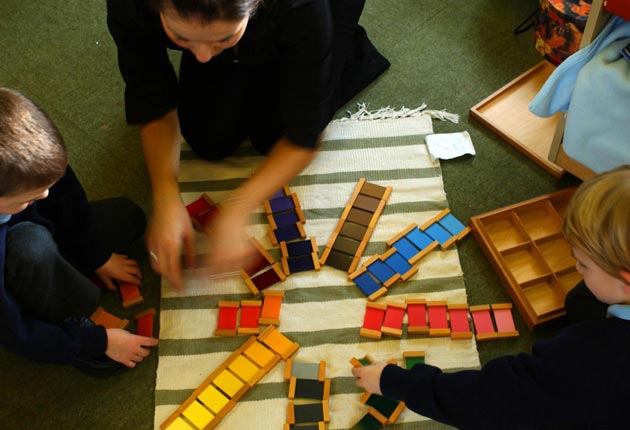First-ever Montessori state school planned
Charity to fund primary in bid to promote alternative teaching method

The Montessori Schools Association is planning to set up a state primary school in the UK for the first time.
The move would pit its radical liberal teaching methods against the more formal approach to the curriculum adopted by state primary schools.
The association is considering four potential areas in London for the new school – Barking, Islington, Kensington and Chelsea, and Tower Hamlets.
The idea would be for its charitable wing to pump £5m into the new venture, backed by extra funding either by a local authority or private sponsor.
Philip Bujak, its chief executive, told The Independent: "The idea would be to set up a bespoke Montessori primary school."
Five state primary schools have already approached Montessori to use its teaching methods in their schools.
In one, Gorton Mount in Manchester, the technique has been used for five years and will eventually be adopted throughout the school. The school has seen improvements in its test results for 11-year-olds since adopting Montessori's system, although ironically the Montessori method runs contrary to the testing-and-targets approach adopted in the state sector.
Under it, children are allowed to learn at their own pace, with little whole-class teaching. They can spend as much or as little time on a topic as they want.
The technique was pioneered by Dr Maria Montessori, an Italian physician and educator, at the beginning of the 20th century and is in widespread use, particularly in Scandinavian countries.
The Montessori Schools Association has been disappointed with the response from the state sector to an offer to take up and use its teaching techniques.
"Hence, we have decided if the mountain won't come to Mahomet, Mahomet must go to the mountain," said Mr Bujak. "The school will be both managed and run by the local authority. Our only input will be the teaching input. The charity will gift the school to the local authority.
"We would then compare the results between two groups of children – those educated by the Montessori method and those taught at a traditional state primary school.
"Local people will be recruited and trained to work in the school. It will have green values and provide local employment.
"We're looking for a local authority to partner with with a view to opening in 2012."
The school would have a teacher-training wing to promote Montessori teaching methods. A research project would be set up to assess its achievements.
Montessori has also been in talks with the New Schools Network, the charity set up to encourage response to the Conservatives' proposal to set up a network of independent "free" schools funded by the state.
Conservatives want a number of sponsors – including teachers' and parents' groups – to come forward to run their own schools.
"If private individuals want to adopt a school, or parents want to run a state school along these lines, then we would provide the training," said Mr Bujak.
"We're a prime candidate for the New Schools Network policy. After all, who else has got experience of opening 700 schools in the private sector?"
At present, there are 631 registered Montessori primary and nursery schools in the private sector.
In all, though, around 700 schools use its methods of teaching, educating around 31,000 pupils.
Freedom to learn: How it works
The Montessori method is an approach to child education based on the work of Italian physician Maria Montessori in the early 20th century.
Children are given the freedom to learn at their own pace and to choose topics which hold their attention The child is said to have an inner natural guidance which allows self-directed development.
A teacher watches over the environment and removes anything which could interfere with a child's learning. In educational jargon, the teacher acts more as a facilitator rather than as an instructor.
The method was developed in 1907 when Dr Montessori observed young children in an environment where they were able to use materials as they wished. During the study Dr Montessori said she felt she had discovered what she referred to as "The child's true normal nature". She spent the rest of her career writing books on the subject. The method is usually applied to children between the ages of nought and six.
Sarah Fitzmaurice
Subscribe to Independent Premium to bookmark this article
Want to bookmark your favourite articles and stories to read or reference later? Start your Independent Premium subscription today.

Join our commenting forum
Join thought-provoking conversations, follow other Independent readers and see their replies